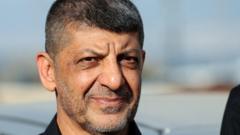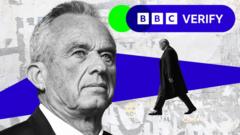
Hezbollah’s Media Chief Killed in Israeli Strike in Beirut
Hezbollah’s media chief Mohammed Afif was killed in an Israeli strike on Sunday in central Beirut, marking another significant escalation in the ongoing conflict between Israel and the Lebanese militant group. The strike hit the headquarters of the Baath political party in the densely populated Ras al-Naba neighbourhood, destroying most of the building.
According to Lebanon’s health ministry, four people were killed and 14 were injured in the attack. Afif, one of the few remaining public faces of Hezbollah, was last seen on Monday during a press conference in Beirut’s southern suburbs. The group confirmed his death several hours after initial reports.
The Lebanese Baath Party, a branch of the Syrian Baath Party led by President Bashar Al-Assad, is a long-time ally of Hezbollah. Its headquarters are located at a crucial intersection connecting various parts of Beirut.
BBC Middle East correspondent Lina Sinjab expressed concern that Israel might be expanding its attacks beyond military officials, potentially targeting political representatives. She suggested this development indicates further escalation rather than de-escalation of the conflict.
Later on Sunday, another strike on Mar Elias Street in central Beirut killed two people and wounded 13 more. The Israeli Defense Forces (IDF) had earlier conducted strikes on six Hezbollah military targets in the southern suburbs.
This recent attack is part of an intensified Israeli military campaign against Hezbollah. In late September, Israel killed Hezbollah’s leader Hassan Nasrallah and other top commanders in Beirut strikes. The Israeli military stated its objective was to enable the return of tens of thousands of displaced residents to the country’s north.
The conflict escalated following Hamas’s attack on Israel on October 7, 2023, after which Hezbollah increased rocket attacks in support of Palestinians. The consequences have been devastating: more than 3,400 people have been killed in Lebanon, including at least 2,600 since Israel launched its air campaign and ground invasion in late September. Additionally, 1.2 million people have been displaced.
The ongoing tensions occur against a backdrop of renewed diplomatic efforts led by the US for a ceasefire. However, the continued targeted strikes and rising casualties suggest that a peaceful resolution remains distant.
The killing of Afif and the subsequent attacks highlight the volatile situation in the region, with both sides seemingly unwilling to de-escalate. The strikes not only target military personnel but also appear to be expanding to political figures and infrastructure, raising concerns about a potential broader conflict.
As the international community watches, the human cost continues to mount, with civilians bearing the brunt of this prolonged and increasingly complex confrontation.









